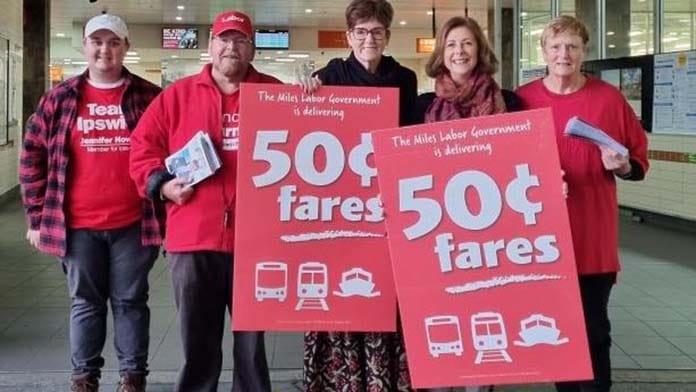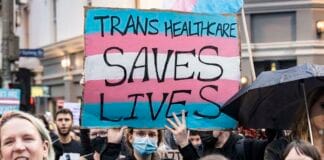Labor has lost office in Queensland after nearly a decade. While early polling indicated an LNP landslide, in the end Labor managed to avoid total humiliation—but still suffered a substantial 7 per cent swing.
This is an ominous sign for the future of Anthony Albanese’s federal Labor government, which faces an election by May.
Underpinning this electoral disaster is the sharpest fall in living standards in generations. Newspoll found that 51 per cent of the electorate listed cost of living as their number one concern while 23 per cent listed it as number two.
People are hurting and were out to punish the government. The further from the relatively prosperous inner suburbs of Brisbane, the greater the swing against Labor. They lost traditionally safe seats in Rockhampton, Maryborough and Mackay with swings between 13 and 15 per cent.
Labor understood the cost of living was a central issue and attempted to deal with their plunging popularity by changing leaders ten months before the election and moving sharply to the left.
In June they passed a budget full of cost-of-living discounts including rebates on electricity bills, reduced car registration costs, 50 cent public transport fares and vouchers for children’s sport and recreational activities.
This was followed by promises to fund 50 new bulk-billing GP clinics, state-owned petrol stations and free school lunches for primary school students. These promises would be funded by taxing “big mining companies”.
Labor also warned the LNP would initiate an “orgy of cutting, sacking and selling” like the previous LNP government.
Small target
The LNP, led by David Crisafulli, sought to make themselves as small a target as possible. They supported Labor’s electricity rebates and the 50 cent public transport fares and said, “Anything that’s in the budget is going to be honoured”.
Crisafulli even refused to support nuclear power, one of federal Liberal leader Peter Dutton’s centerpiece policies, saying it was “not on our agenda”.
Only on the issue of abortion did Labor manage to get some traction. In 2018 Crisafulli and all but three LNP MPs voted against Labor’s Termination of Pregnancy Act that decriminalised abortion. Crisafulli said rolling back abortion rights was “not part of our plan”, but he refused to commit the LNP members to a binding vote.
This created the potential that a promised private member’s bill on abortion, introduced by the Katter Party, could pass. Crisafulli’s mealy-mouth responses made him look dodgy and provided a glimpse of his real agenda.
The LNP campaigned hard on “youth crime” promising to introduce “adult time for adult crime” penalties by Christmas. Youth crime rates have fallen by 50 per cent over the last 14 years, while Aboriginal kids are locked up in unprecedented numbers. But a consistent racist campaign against Black youth in regional areas by the LNP and some media organisations has elevated the issue in state politics since 2022 and led to vigilante attacks.
Disgracefully, but typically, Labor’s response has been to move to the right, twice overriding their own Human Rights Act to introduce draconian laws they boasted were the “toughest in the nation”. But this only legitimised the LNP’s fear campaign, allowing “youth crime” to remain a major election issue.
Vote buying and the Greens
Labor’s sudden swing to the left, after nine years of middle-of-the-road conservative rule, was initially seen as desperate vote buying.
But the more people became concerned about Crisafulli’s trustworthiness and the social conservatism of his MPs, the more Labor, particularly in Brisbane, was able to roll back the LNP’s lead. In the end it was too little, too late.
While there was no real joy for Labor in the election, The Greens also suffered. Despite their claims as they targeted Labor electorates in the inner city that, “The Greens can win up to six seats … and transform politics forever,” their vote went backwards in their target seats. They even look to have lost South Brisbane, one of their two existing seats, to Labor.
Anthony Albanese’s claims that The Greens had moved too far to the left or were punished for blocking Labor’s agenda in parliament, however, don’t ring true. Some left-wing voters instead shifted back to Labor out of fear of an LNP government.
While The Greens’ vote didn’t collapse there was no sign that working class voters were looking to them to solve the cost-of-living crisis.
In the industrial city of Gladstone, Labor’s vote fell by over 18 per cent but The Greens increased their vote by only 1.9 per cent. The Greens remain very much confined to the inner city where they spend much of their time and resources.
Nasty and right-wing
Crisafulli and the LNP are riding high but they have created an albatross for their own necks. Big business will demand budget restraint and the LNP can fulfil this only by rolling back their election commitments or attacking in other areas.
Peter Dutton’s plan for nuclear power will have an enormous hole in it unless he can convince Crisafulli to repeal the state’s nuclear ban. The Katter Party will at some point put forward their regressive abortion bill and test Crisafulli and his rabidly socially conservative backbench on where they stand.
Crisafulli is desperate to distance himself from the memory of the last Queensland LNP Premier Campbell Newman, who sacked 14,000 public servants and went on a privatisation binge.
But the Crisafulli government will be nasty and right-wing. The crucial question for workers is how we build a fighting alternative.
By Mark Gillespie






